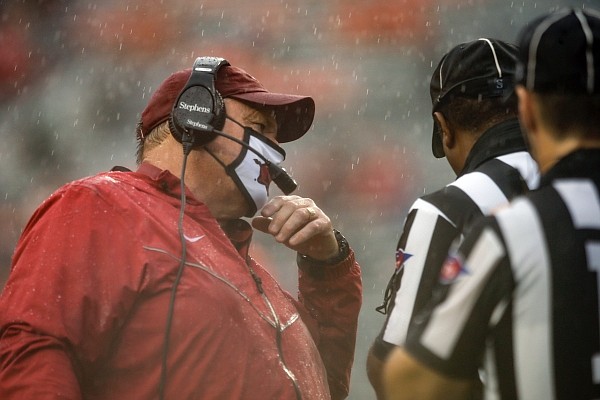FAYETTEVILLE — Arkansas fans seething over the controversial decision at the end of the Auburn game have become familiar with the term “immediate continuous loose-ball action” over the past few days.
It is the SEC office’s description of what happened after Auburn quarterback Bo Nix’s bungled spike turned into a backward pass and thus a fumble with 30 seconds left in the game.
SEC supervisor of officials John McDaid told the Arkansas Democrat-Gazette on Monday if Arkansas safety Joe Foucha’s initial recovery attempt on the loose ball had been made at the Auburn 26, the ruling of “incomplete pass” on the field would have been overturned and the Razorbacks awarded possession.
Instead, the replay team concluded the immediate continuous loose-ball action had ended after that attempt, McDaid said, as the ball hit center judge Mike Block’s foot as he whistled and signaled incomplete pass.
Asked why Foucha’s continued scramble and eventual securing of the ball could not be judged as an extension of the recovery process, McDaid said, “The judgment in replay was that there was visible evidence of players slowing down — obviously not [Foucha], but others — and basically heeding what the whistles and the signals are for, signaling to the players that the play is over.”
McDaid was asked how the Foucha recovery was different from a play in the South Carolina at Missouri game from last season. In that game, a pass from South Carolina’s Ryan Hilinski was batted at the line of scrimmage in the air back to Hilinski, who caught it briefly on his own 1, then shoved it backward into the end zone.
Missouri’s Cale Garrett eventually recovered the loose ball in the end zone, and the on-field officials called the play an incomplete pass. However, a video review overturned the call and deemed the result of the play a Missouri touchdown.
“The major differences, and they are major, they are significant,” McDaid said, “is that in the play in Columbia, where Missouri secures possession of that loose ball after replay comes in and states that the second pass by the South Carolina quarterback is not forward but backward.
“The major significant differences are, and there’s two of them: There are no South Carolina players in the proximity of that loose ball in the upper corner of the end zone. It’s only Missouri players, defensive players. And No. 2, there’s no official in close proximity to that loose ball that is blowing his whistle and making a signal to kill the play.”

